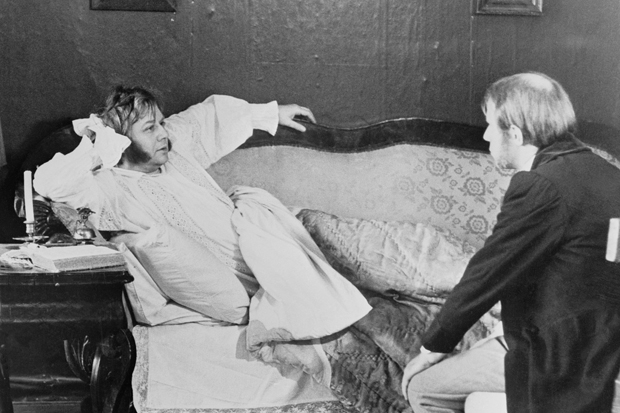Oblomov, first published in 1859, is the charming tale of a lazy but lovable aristocrat in 19th-century Russia. The novel’s eponymous hero cannot see the point of doing anything at all, and spends his time lying in bed or wandering around his St Petersburg flat in his beloved oriental dressing gown, bickering about the dusting with his manservant. The newspaper on the desk is a year old; flies buzz from the inkwell. Oblomov broods; he worries; he thinks.
The book’s author, Ivan Goncharov, is perhaps little-known now, but in its time Oblomov was hugely popular in Russia. Tolstoy, that venerable, saintly moralist, was deeply in love with it, writing: ‘Oblomov is a truly great work, the likes of which one has not seen for a long, long time. I am in raptures over Oblomov and keep re-reading it.’
Later, that humourless man of action Lenin saw Oblomov himself as a symbol of everything that was wrong with Russia. The book and its central character had had such a success that ‘Oblomovism’ became an adjective for sluggishness, and even today an ‘Oblomov’, meaning ‘a lazy person’, is a word used by Russians who have never read the book. Lenin believed that if social progress was to be made, then Russians must cleanse their Oblomovian tendencies.
In actual fact, like many apparent idlers, Oblomov is not really lazy — or at least he is only slothful in the physical sense. Intellectually, he is a fizzing ball of energy. It’s just that he spends a lot of time in bed. But he is thinking, thinking hard, all the time. He is a philosopher. His observations on the vanity of human effort are positively Christ-like — or at least like the Christ of the Sermon on the Mount:
Isn’t everybody looking for the same thing as me? After all, surely the purpose of this hustle and bustle of yours, all these passions, wars, trade and politics is to achieve precisely this very peace and quiet, to strive for this ideal of paradise lost?
The most wonderful section of the book is probably the extended utopian fantasy, ‘Oblomov’s Dream’, an idealisation of his own childhood, where our protagonist conjures up a Virgilian bucolic idlyll:
The river burbles merrily and playfully along, widening in spots into a pool and then, narrowing into a swift thread of a current, pauses for reflection and just trickles over the rocks, branching into frisky rivulets whose babbling lulls the surrounding countryside into a sweet slumber.
As for the people of ‘Oblomovka’, as this land is known,
There are no robberies, murders or other calamitous events; their tranquility is never broken by strong passions or ambitious enterprises.
The next section is taken up by a long, painful and ultimately failed courtship. Oblomov’s love of thought and his kindness lead a spirited girl called Olga to fall in love with him. They enjoy many winding conversations, but that’s about it. Tragically, his incapacity for action destroys what might have been, and finally Olga rejects him:
You’re ready to spend the rest of your life billing and cooing under the eaves. But that’s not me, that’s not enough, I need more than that, although what exactly, I’m not sure… Gentleness, that’s easy to find!
On hearing these words, Oblomov collapses and falls into a deep illness. Olga goes off with Oblomov’s best friend, the energetic German Stolz. Oblomov retreats to his flat and marries a servant girl.
This is the second translation of Goncharov’s classic I have read, and to be honest I can’t see much difference between them. The charm of the novel comes through in both, but I suppose that a good deal of the original’s subtlety must be lost, however skilful the translator. Oh, what a delight it must be to read it in Russian! I see Goncharov as a kind of Samuel Beckett with added ornamentation and pleasure, but I’d have to check with a Russian speaker to find out whether that’s so.
Oblomov is a beautiful and romantic novel. It is gloriously purposeless and no one who was serious about the business of life would ever waste their time reading it. I’d be willing to wager a million pounds that it does not sit on Alan Sugar’s bookshelf. It is a book to be re-read, savoured and pondered about. And of course you must read it in bed, and let it fall from your hands as you sink into a delightful reverie. Great riches lie between its covers. It is also an oddly modern book: in its treatment of childhood it is positively Freudian, and the female characters are strong.
But above all Oblomov is an extended meditation on that old question which has perturbed man for millennia, and which we are no closer to solving today than we were in the time of Zeno, Socrates and Epicurus: which is superior, the active life or the contemplative life?
Available from the Spectator Bookshop, £7.59 Tel: 08430 600033. Tom Hodgkinson is the editor of The Idler, which he established in 1993.






Comments